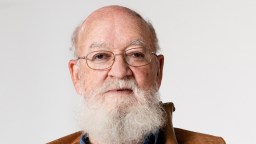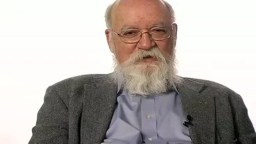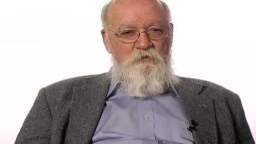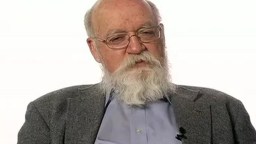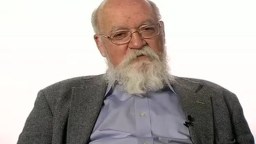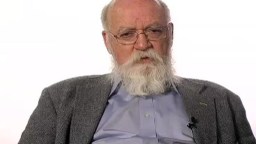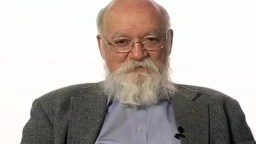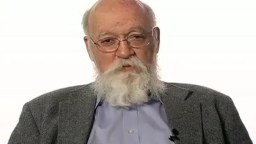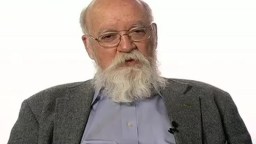Daniel Dennett
University Professor, Director of the Center for Cognitive Studies, Tufts University
Daniel C. Dennett is the Austin B. Fletcher Professor of Philosophy and director of the Center for Cognitive Studies at Tufts University.
Dennett believes it's time to unmask the philosopher's art and make thought experimentation accessible to a wider audience.
"How to Think Like a Philosopher," Dennett's five-part workshop, is a journey into the labyrinthine mind games played by Dennett and his colleagues. For the more utilitarian-minded, these are mental practices that will improve your ability to focus and think both rationally and creatively.

“Forget about essences.” Philosopher Daniel Dennett on how modern-day philosophers should be more collaborative with scientists if they want to make revolutionary developments in their fields.
▸
12 min
—
with
Philosopher Daniel Dennett believes AI should never become conscious — and no, it’s not because of the robopocalypse.
▸
4 min
—
with
We are what we are because of genes; we are who we are because of memes. Philosopher Daniel Dennett muses on an idea put forward by Richard Dawkins in 1976.
▸
7 min
—
with
The human mind is like a Turing machine, says Daniel Dennett. It’s made up of unthinking cogs – but when combined in the right order, their motion gives rise to consciousness.
▸
7 min
—
with
Philosopher Daniel Dennett explains how the optimal strategy for winning a game of rock-paper-scissors isn’t necessarily the optimal strategy for leading one’s life.
▸
4 min
—
with
Philosopher Daniel Dennett take us through one of his “favorite bad thought experiments,” an investigation of free will based on the sci-fi film “The Boys From Brazil.”
▸
6 min
—
with
Dennett rebuts the argument that neuroscience implies we don’t have free will.
▸
6 min
—
with
Philosopher Daniel Dennett investigates the theories related to how the brain represents ideas and beliefs while pondering an Inception-like situation in which beliefs are surgically inserted into a patient’s brain.
▸
4 min
—
with
Daniel Dennett explains how intuition pumps (often referred to as “thought experiments”) help guide philosophers’ curiosity and thinking.
▸
3 min
—
with
Philosopher Daniel Dennett discusses reductio ad absurdum, “the workhorse of philosophical argumentation,” wherewith thinkers test the validity of an opponent’s argument by taking it to its most illogical extreme.
▸
3 min
—
with
I think that philosophers are deeply resistant to acknowledging that most of the interesting categories they deal with have fuzzy boundaries.
The video is part of our series of the most popular videos of Summer 2013.
I wanted to draw attention to how philosophers actually go about their business and get them thinking more self-consciously about the tools they use and how they use them.
Here is a thought experiment that shows beliefs don’t parcel themselves out the way sentences do.
People have hang-ups and blind spots and phobias and just sometimes they have a principled refusal to take something seriously.
You can create mental machinery for decision making.
It’s the sort of general purpose crowbar of rational argument where you take your opponent’s premises and deduce something absurd from them.
If you’re playing Rock-Paper-Scissors with God, then you should want quantum indeterminacy.
Why don’t we hesitate getting into a car and driving 60 miles an hour with cars coming towards us at 60 miles an hour in the opposite lane?
For billions of years on this planet, there was life but no free will. The difference is not in physics—which has remained the same—but is ultimately in biology, specifically evolutionary […]
Daniel Dennett Reveals His Favorite Philosopher.
▸
2 min
—
with
When Daniel Dennett Changes His Mind.
▸
3 min
—
with
Daniel Dennett Explores Darwinism and Outer Space.
▸
5 min
—
with
Why Daniel Dennett applies Darwinism to everything.
▸
4 min
—
with
Daniel Dennett on the future of the human brain.
▸
2 min
—
with
Daniel Dennett Investigates Energy Innovation.
▸
2 min
—
with
Daniel Dennett Discusses the Problem of Robotic Warfare.
▸
7 min
—
with
If you look inside each neuron in the human brain, you will find motor proteins that are a bit of mindless nano-engineering.
▸
2 min
—
with
Our brains are cunningly evolved, cunningly designed to make life easier for us.
▸
3 min
—
with
Daniel Dennett with the argument against humanoid robots.
▸
3 min
—
with
